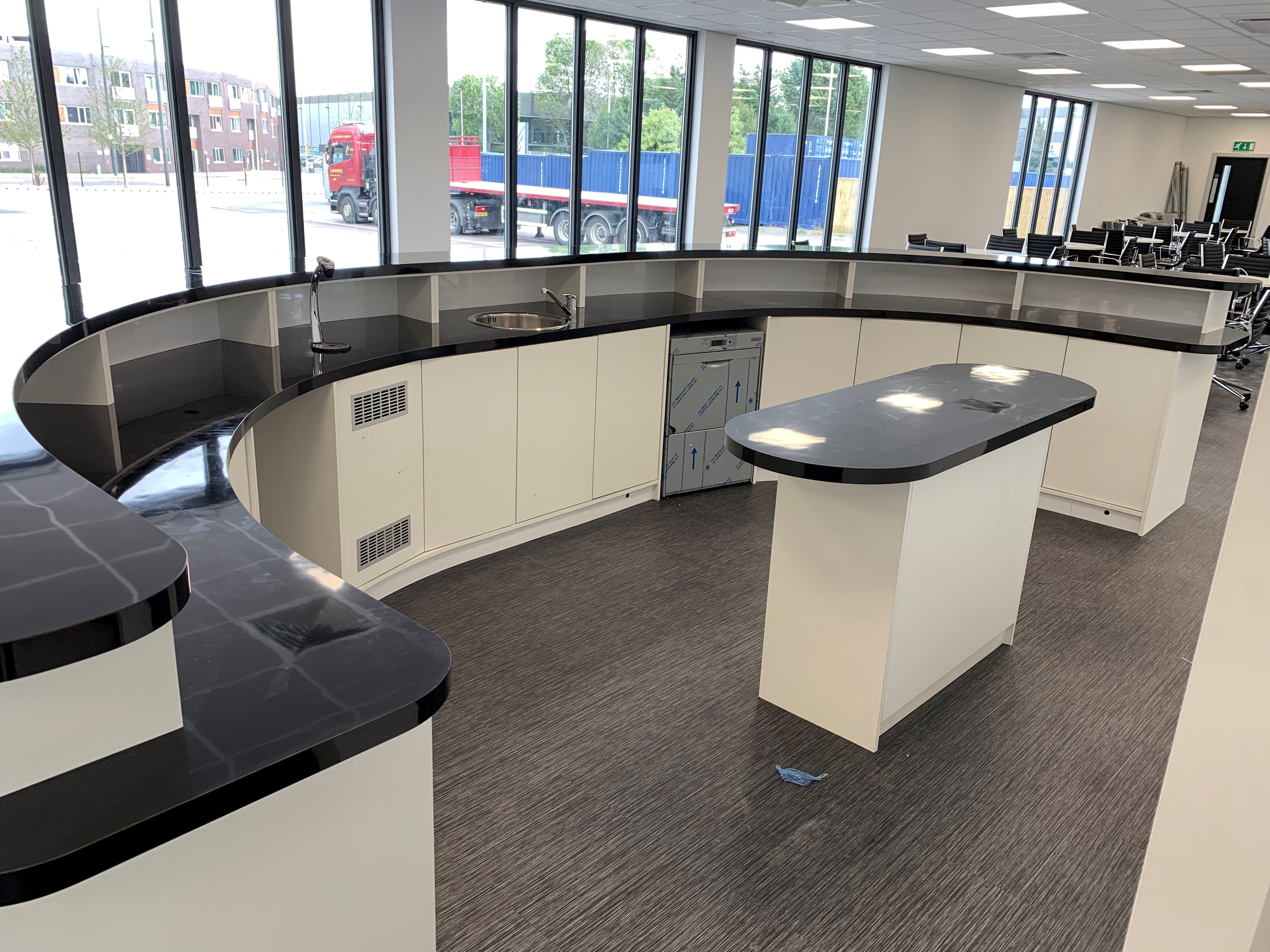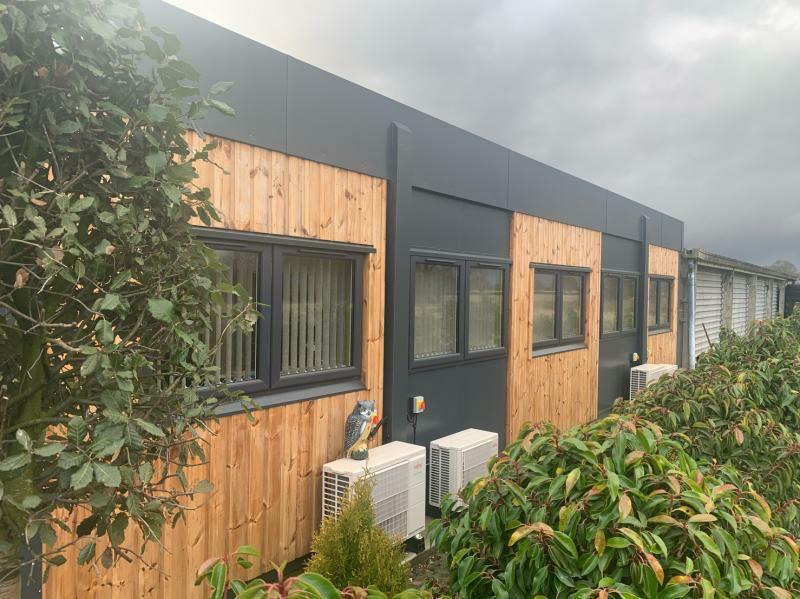So, your business needs new premises and you are deciding between a traditional build or modular buildings. It's a tough choice. While modular buildings were once considered a cheap, second-rate spacing alternative to traditional structures, modular construction is becoming more advanced over time.
As modular buildings have become more modern and gained popularity, the modular construction industry has grown significantly. The compound annual growth rate of the UK Modular Construction Sector is 4.2%. This sector growth demonstrates the increase in people opting for modular buildings rather than traditional ones.
When choosing between modular and traditional buildings, it is important to understand how the two construction types differ. To make your decision, consider factors like time, cost and sustainability.
How is modular construction different from traditional construction?
Traditional construction is a linear process that happens predominantly on-site. Construction workers build from the ground up; starting with foundations. Weather can affect this process, which can delay the construction process. Once built, traditional structures remain at the site where they were constructed.
Modular building companies, on the other hand, use offsite construction to their advantage. 70% of a modular building’s construction happens in a dedicated factory facility before being transported to and installed on-site. This allows any groundwork or site work to be carried out while the modular building is being constructed. It is no surprise, then, that the modular construction industry is growing.
Time-efficient construction
In all types of construction, time is a valuable resource and an essential factor for buyers to consider. Building time can impact not only how long you wait to get your new property but also the cost and environmental impact. The longer it takes to build, the more builders need to be paid, and the more carbon emissions released.
Traditional construction is a more time-consuming venture. It can take around two years to build a traditional house: 2 weeks for foundations, 12-16 weeks for the shell to wind and water-tight stage, and 24 weeks for fitting out and finishing.
Modular buildings, on the other hand, are incredibly time-efficient. Their factory construction ensures factors like weather and material deliveries do not cause any delays. Once transported to your site, modular buildings are incredibly quick to install. Overall, modular buildings are between 30% and 50% faster to build than traditional.
Modular buildings are your best bet if you need space in a hurry. Paragon Space can provide quality buildings in as little as 4-6 weeks.

Cost-effective buildings
It is crucial to consider cost efficiency and predictability when investing significantly in a building.
Traditional buildings tend to be much more expensive than modular buildings. It is also more challenging to predict the overall cost of a conventional construction project, as they typically drive up unexpected project costs. For example, material costs fluctuate over time, and traditional buildings take a long time to construct. This material cost fluctuation means the budget can be more difficult to predict, especially as time goes on.
Modular buildings, however, are cost-effective and predictable. Factory modular construction is standardised, meaning unexpected changes are often avoided. Weather damage and costly repairs as a consequence are prevented. Factory construction also minimises transportation and installation costs.
Sustainable construction choices
According to research by Bimhow, the construction industry contributes to 23% of air pollution, 50% of climatic change, 40% of drinking water pollution and 50% of landfill waste. So, it is more important than ever to choose sustainable construction methods.
Sustainability in traditional construction is hard to measure and depends on contractors and materials. However, modular construction has numerous sustainability advantages.
Modular building companies use volumetric construction to minimise waste materials and ensure that any waste produced is reused, repurposed or recycled. As well as reducing landfill waste, factory construction lowers CO2 emissions. This is due to fewer vehicles being used in transportation.
Modular buildings are not only environmentally friendly during construction. They are also built to be green throughout their lifespan. They feature quality insulation, double-glazed windows, advanced sealing techniques, and HVAC systems. These all help modular buildings retain heat, which contributes to reduced energy consumption, which in turn reduces running costs.
As well as all of this, modular buildings can be reused and refurbished for various purposes. They are also available to buy or hire, new or used, to get the most use out of and extend the lifespan of modular buildings. By choosing modular construction, you can be part of a circular economy.

What are some other benefits of modular buildings?
Modular construction provides quick, cost-effective, and environmentally friendly spacing solutions. As well as these, modular buildings have a number of other benefits, which have contributed to their increasing popularity.
Modular buildings offer:
High quality: Factory construction is standardised so that you can guarantee top quality. Modular buildings meet the same codes and requirements as traditional buildings.
Durability: Modular buildings can provide long-term solutions and are also classified as permanent structures, which last upwards of 30 years.
Adaptability: Modular buildings can be reconfigured, relocated and expanded to fit changing requirements.
Bespoke customisation options: Modular building companies offer a full turnkey solution with many customisation options. This ensures your building is made bespoke to fit your exact needs.
Due to providing so many advantages, modular buildings are becoming increasingly common in a wide range of sectors. Some of these are:
Education
Healthcare
Corporate/offices
Security
Construction
And more…
Bespoke modular buildings from Paragon Space
Modular buildings offer a fast, cost-effective and sustainable solution for any premises. At Paragon Space, we offer a complete turnkey solution to provide a bespoke building that is exactly right for you.
Paragon Space is a CHAS-accredited modular building company based in Hull, working nationwide. We have over 20 years of experience in manufacturing top-quality modular buildings for a range of sectors.
Are you ready to choose modular construction? Then contact us today! Our friendly experts can guide you through the process and answer any questions you might have.